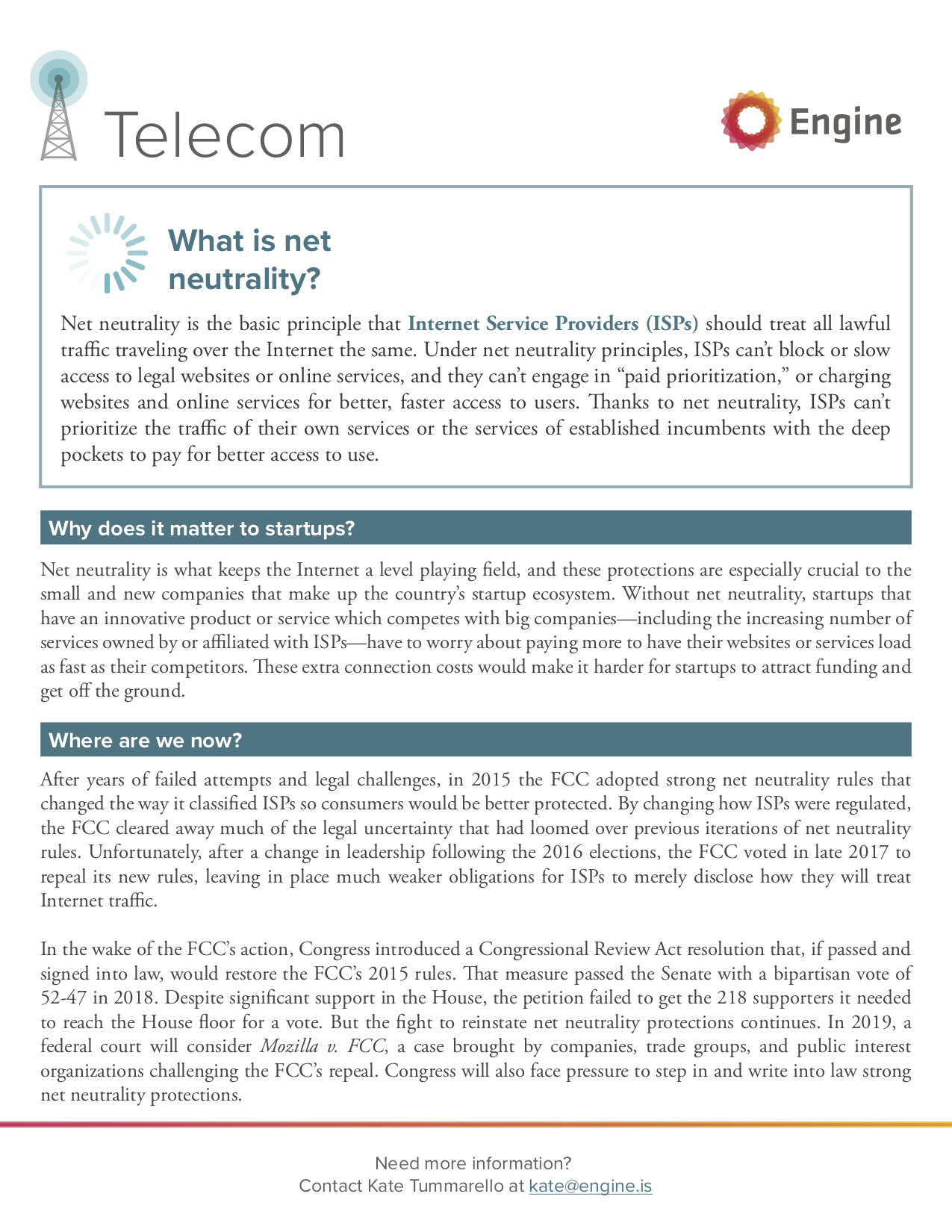Net Neutrality
What is net neutrality?
Net neutrality is the basic principle that ISPs should treat all lawful traffic traveling over the Internet the same. Under net neutrality principles, ISPs can’t block or slow access to legal websites or online services, and they can’t engage in “paid prioritization,” or charging websites and online services for better, faster access to users. Thanks to net neutrality, ISPs can’t prioritize the traffic of their own services or the services of established incumbents with the deep pockets to pay for better access to use.
Why does it matter to startups?
Net neutrality is what keeps the Internet a level playing field, and these protections are especially crucial to the small and new companies that make up the country’s startup ecosystem. Without net neutrality, startups that have an innovative product or service which competes with big companies—including the increasing number of services owned by or affiliated with ISPs— have to worry about paying more to have their websites or services load as fast as their competitors. These extra connection costs would make it harder for startups to attract funding and get off the ground.
Where are we now?
After years of failed attempts and legal challenges, in 2015 the FCC adopted strong net neutrality rules that changed the way it classified ISPs so consumers would be better protected. By changing how ISPs were regulated, the FCC cleared away much of the legal uncertainty that had loomed over previous iterations of net neutrality rules. Unfortunately, after a change in leadership following the 2016 elections, the FCC voted in late 2017 to repeal its new rules, leaving in place much weaker obligations for ISPs to merely disclose how they will treat Internet traffic.
In the wake of the FCC’s action, Congress introduced a Congressional Review Act resolution that, if passed and signed into law, would restore the FCC’s 2015 rules. That measure passed the Senate with a bipartisan vote of 52-47 in 2018. Despite significant support in the House, the petition failed to get the 218 supporters it needed to reach the House floor for a vote. But the fight to reinstate net neutrality protections continues. In 2019, a federal court will consider Mozilla v. FCC, a case brought by companies, trade groups, and public interest organizations challenging the FCC’s repeal. Congress will also face pressure to step in and write into law strong net neutrality protections.
Broadband Access
What is broadband access?
Broadband access is the ability to get online. The federal government has several avenues for building out broadband access across the country, and many policymakers include broadband access as a critical part of plans to push for improved infrastructure in the 21st century.
Most of the work the federal government does to improve Internet access has to do with wireline broadband, or the Internet that’s available through cables in the ground. Government agencies, especially the Federal Communications Commission and the U.S. Department of Agriculture, have several programs to encourage wireline broadband buildout through grants or subsidies. Those programs are often aimed at boosting Internet access in specific communities, such as rural areas or educational institutions.
The federal government also controls who can offer Internet access over electromagnetic spectrum, or the airwaves that fuel wireless cell phone networks, WiFi networks, communications between Bluetooth devices, and more. Spectrum is an inherently limited natural resource, and much of the most-suitable spectrum is already set aside for use by the federal government. The public’s access to the Internet is available via two types of spectrum: licensed and unlicensed. The FCC auctions off billions of dollars of licenses for licensed spectrum every few years to big companies like AT&T, Verizon, and Sprint, who use those to provide Internet and voice services over cellphone networks across the country. Unlicensed spectrum are the typically short-distance airwaves that are open for use by anyone, and these are the airwaves that power WiFi networks.
Why does it matter to startups?
The growth of the U.S. startup ecosystem—and the small, young, tech-enabled, high-growth companies that comprise it—is made possible by entrepreneurs’ access to the Internet. With a connection to the open Internet, an entrepreneur located anywhere in the country can create and grow a company that reaches users across the world. As broadband access increases and improves, so too does the opportunity for innovation.
Additionally, the availability of unlicensed spectrum has created opportunities for the companies that make and use technology that relies on high-frequency airwaves for wireless device-to-device communications, like Bluetooth speakers or autonomous vehicles.
Where are we now?
The federal government is constantly working to improve access to broadband across the country, whether by increasing the amount of spectrum available for use by the public or by providing incentives for companies to build out wired broadband networks. As the debate over broadband in D.C. can often become dominated by the large companies vying for either the spectrum or the incentives, it’s critical that the startup community regularly weigh in to provide the perspectives of the small companies that rely on Internet access.



